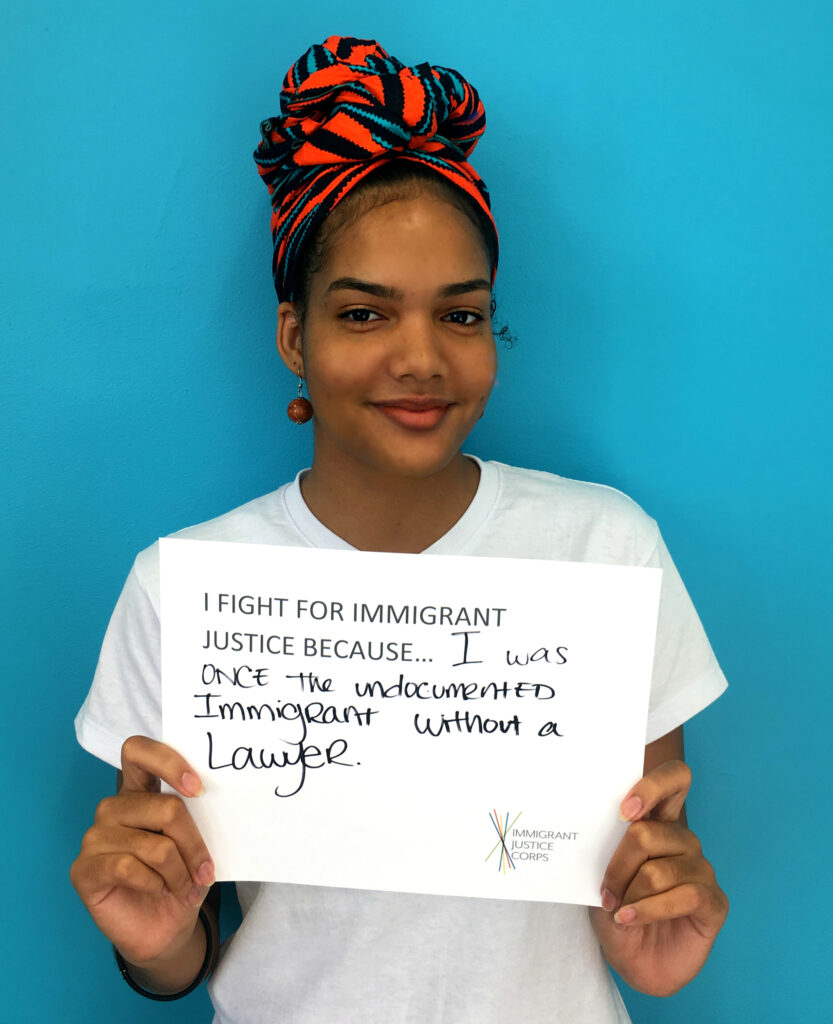Where are they now?: Miriam Lacroix
In the “Where are they now” series, we will introduce you to former IJC Fellows and share their stories — how they became a Fellow, their career path, and what they have learned along the way.
Miriam Lacroix, a member of the inaugural 2014 Justice Fellow cohort, reflects on the IJC alumni network, shares her advice for current and future Fellows, and speaks to her goal of bettering the reputation of private immigration attorneys.
In 2014, Miriam Lacroix applied to IJC, already determined to pursue a career in immigration law.
A law student at the Elisabeth Haub School of Law at Pace University, Miriam worked in the school’s immigration clinic. As she helped clients apply for asylum, Miriam found the work to be deeply aligned with her values. Her mind was made up — she would be an immigration attorney.
But the path forward was uncertain.
Miriam’s clinic professor recommended she pursue a Fellowship with IJC. Miriam was skeptical, unsure if she was qualified. But she summoned the courage, applied, and interviewed. And soon after, she received the news — she would be part of the inaugural class of Justice Fellows in 2014.
Placed at the City Bar Justice Center, Miriam was given guidance but also encouraged to learn on her own. The Center provides pro bono legal services to low-income clients in New York City.
“We weren’t babied,” Miriam said. “We were expected to do our research.”
Between the Justice Center and IJC training, Miriam learned to be an attorney. She felt comfortable in court, filing documents with government agencies, and representing her clients.
But that wasn’t all she gained from the Fellowship. What Miriam cherishes most are the connections with other Fellows.
“To this day, I reach out to some of those Fellows who are working in areas that I’m not familiar with and they’re always willing to give information,” Miriam said. “Having made those connections has been the most fulfilling part of the Fellowship.”
Since law school, Miriam knew she wanted to start a private immigration practice. But as she worked with clients, she heard story after story of private attorneys failing their immigrant clients. She believed immigration attorneys should be better.
“We’re dealing with people who have so many consequences to wrongdoing in their case,” Miriam said, “If an attorney makes a mistake, that can lead to something that is irreversible.”
Thankfully, the bad reputation didn’t deter Miriam; it inspired her.
“I wanted to go into private practice to sort of change the way people thought about private immigration attorneys,” Miriam said. “We aren’t all only out to get rich off of people’s sad stories.”
After her Fellowship, Miriam went on to be a Founding Partner of Lacroix Ramos in White Plains, NY before stepping out on her own in 2019 to found Lacroix Law, also in White Plains. Her work has focused on removal defense, humanitarian issues, family immigration, and most recently, employment-based immigration cases.
Miriam credits much of her success to her time at IJC and City Bar Justice Center.
“You might want to go into big law, or you might want to join another nonprofit, or you might want to go on to your own practice,” Miriam said. “Just take it all in because you don’t know where you’re going to end up when you’re done with your Fellowship.”
She also urges Fellows to build relationships with each other — “these are the people who will support you going forward,” she said.
“Can you imagine having a listserv of 75 attorneys and non-attorneys who know immigration law to say, ‘I have this really complicated case, and I’m not familiar with family court,’” Miriam said. “There’s going to be someone who has done it, and that’s the amazing part of that.”
IJC alumni, like Miriam, are an active and unprecedented community sharing legal resources, knowledge and mentorship. More than 90% of Fellows have made careers practicing immigration law.
“When I think of access to justice, I think of what IJC is doing, but I also think of changing our system from the inside out,” Miriam said.
Structural systemic barriers within laws and policies make it endlessly difficult for legal service providers to help their clients, Miriam said. And changing the system will take an immense amount of work.
“IJC supporters can make access to justice a reality by using their skills, contacts, or resources to change things from the inside out, to work with law makers, and fight against policies,” Miriam said.
Fun Fact: During her Fellowship, Miriam also made time to pursue her passion outside of immigration law — performing. She took voice lessons and performed in midtown at B.B. King Blues Club & Grill.
